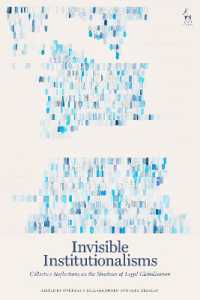- ホーム
- > 洋書
- > 英文書
- > Philosophy
Full Description
This volume draws together work by David Wiggins on topics to do with language, meaning, truth, and the limit of semantic analysis, from 1980 to 2020. Each chapter draws upon previously published material, but that material has been revised, sometimes significantly, for republication here.
Opening with a selective account of a century's work in the philosophy of meaning, from Frege and Wittgenstein to the late twentieth century, the book engages first with the nuts and bolts of sentence-construction: predicates and the copula, quantifiers, names, existence treated as a second-level predicate, and adverbial modification. The following five chapters then treat of definition and (as dreamt of by Leibniz and others) the terminus of semantic analysis; the idea of natural languages as real things with a history; the idea of truth conceived as correlative with inquiry (C. S. Peirce) and, finally, the properties we look for in truth itself--the marks, as Frege or Leibniz might have said, of the concept true.
Contents
Sources
Introduction
1: Meaning and Truth-Conditions: From Frege's Grand Design to Davidson's
2: Concept and Copula
3: Donald Davidson's Account of Semantic Interpretation. How Comprehensive Is It? 'All', 'Some', and 'Most'
4: Names, Existence, and Contingency
5: Modes of Grammatical Combination, Adverbs, and the Case of Action Sentences
6: Three Moments in the Theory of Definition or Analysis: Its Possibility, Its Aim or Aims, and Its Limit or Terminus
7: Locke: 'The Great Conduit'
8: Languages as Things in their Own Right
9: Peirce: Reflections on Inquiry and Truth Arising from his Method for the Fixation of Belief
10: A Substantivist-cum-Indefinibilist Account of Truth and the Marks of Truth








